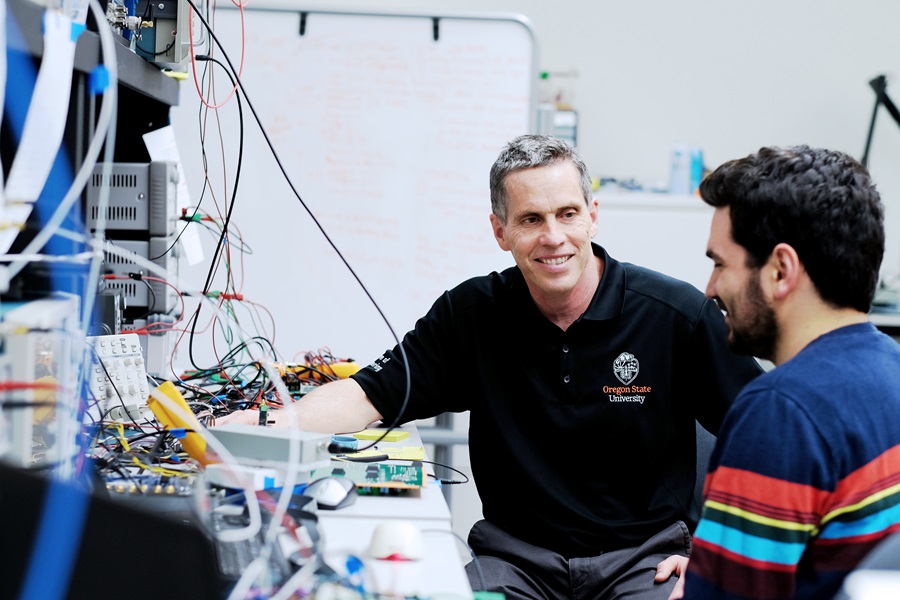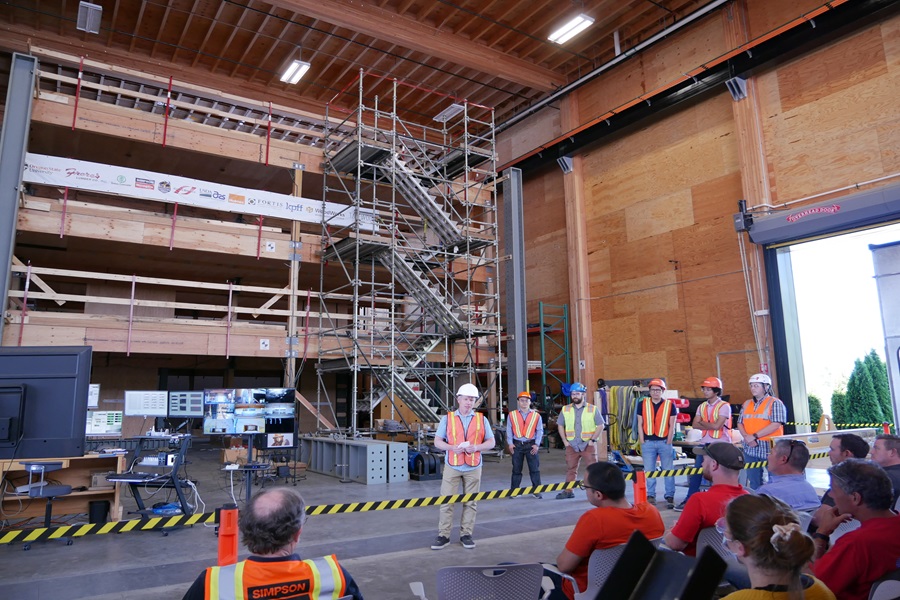The mass timber and microfluidics industry groups will now compete for $500 million in grants to spur American technological competitiveness.
Two Oregon State University-led industry consortiums were among 31 groups designated as national Tech Hubs by the U.S. Department of Commerce’s Economic Development Administration, Oregon’s Congressional delegation announced Monday. After a four-month application process, between five and eight of the 31 designated tech hubs will receive awards between $40 million and $70 million to drive regional innovation, job growth, and advance American competitiveness.
The Pacific Northwest Mass Timber Tech Hub, led by Iain Macdonald, director of OSU’s TallWood Design Institute — a research collaboration between Oregon State’s College of Forestry and College of Engineering and the University of Oregon School of Design — would work to advance Oregon’s growing mass timber industry, which develops construction materials from laminated tree fiber.
The Corvallis Microfluidics Tech Hub, led by OSU College of Engineering professor Tom Weller, would do the same with microfluidics technology, which uses very small amounts of fluid for cooling semiconductors and electronics.

“The purpose of these tech hubs is to take technology that has been proven in the lab and move it forward to commercialization,” Weller tells Oregon Business. “There’s a huge difference between making five or 10 of something and making five or 10 million of something. So having access to the resources that allows innovators and entrepreneurs to make that transition is part of the key concept behind these tech hubs.”
Macdonald and Weller say their group’s next steps will be consulting with industry partners to devise a basket of regional competitiveness projects with the institute’s industry partners which satisfies the stated environmental, workforce development, and domestic production goals of the Tech Hubs Initiative.
For Macdonald, this means consulting mass timber manufacturers like Timberlab, and its parent company Swinerton Builders, about projects to pitch for the tech hub initiative. Weller says his group will reach out to the likes of Intel, HP, and Thermo Fisher Scientific, about projects to scale up microfluidics manufacturing.
“We don’t want to be telling the industry that we know better than them, first and foremost. We already work closely with the industry,” Macdonald tells OB. “We’re usually talking to them about smaller, discreet kind of projects to generate data and increase knowledge. Now it’s ‘How can we turn this whole region into the preeminent mass timber-producing region?’ So, it’s a bit of a different conversation.”
Even though OSU applied for the tech hub designation, both Macdonald and Weller say the funding for the projects – if approved – would be divided among industry groups and industry partners. Both say the Department of Commerce grants will be easy to distribute directly to industry, since the projects are not required to be run through public entities.
“The universities are going to play an important role when it comes to helping develop workforce development and training programs, and we do expect that our faculty and our researchers will be involved as entrepreneurs and innovators, but this is really focused small innovative startup companies and research groups within established companies,” Weller says. “It’s also not just Oregon State. It’s the University of Oregon, it’s OHSU. It’s working with our community college partners and our economic development partners. It’s really a whole system approach. OSU is leading this but it’s really a team effort.”
One potential project idea Macdonald floated was a collaboration with the Port of Portland’s modular housing innovation campus. “We have a state-of-the-art, mass timber modular housing factory that will be going up there. And there could be a whole training program technology transfer program based out of there to train on this emerging field,” he says.
“There’s very much an impetus to push that made-in-America agenda, bringing technology back home. In the mass timber context that’s important because we are seeing the industry develop nicely around the country – more designers engineers, and construction firms know how to design and build these things – but still, we’re seeing European firms who have been around for a couple of decades longer than ours ship the products to our doorstep cheaper than domestic firms are providing right now,” Macdonald says. “So, there’s clearly some work that needs to be done in the supply chain, efficiencies, and training and development and looking at business models are looking at getting investors to adequately capitalized.”
The tech hubs program was authorized by the CHIPS and Science Act, which was signed into law by President Biden in August 2022.
All 31 Tech Hubs now face a tight deadline to develop projects to pitch to the Department of Commerce. The deadline for Phase 2 applications is 4:59 p.m. Eastern Time on February 29.



